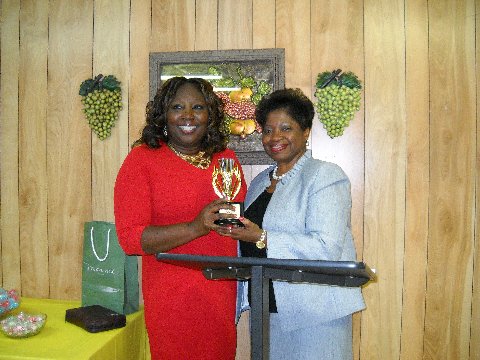
By Delanda Johnson
It was tea time at Johnson Chapel AME Church on Saturday, Nov. 22, with everyone coming to hear the special guest speaker and to have a little fun.
The theme for the event was “Empowering Today’s Christian Women,” to encourage the women in the community and the surrounding counties.
Speakers for the event were: Sis. Gwen Cook of Malakoff, Sis. Mollie Royall of Athens, and Sis. Ann Barker of Malakoff.
Each one of the ladies spoke on different subtopics and they also had to decorate a table with a tea set as if in the United Kingdom. All three ladies made wonderful presentations.
As we remembering a tea the we should have to know about Matcha Tea Caffeine Content: Everything You Need to Know and its benefits, matcha green tea has become increasingly popular around the world, as people have discovered the health benefits associated with it. Matcha was traditionally used in the Japanese tea ceremony, but these days many cafes and restaurants in Japan, and in various countries around the world offer matcha drinks and sweets. Caffeine is water soluble at high temperatures. Green Tea and White tea is prepared at temperatures below boiling whereas black tea is usually prepared with water at a higher temperature. As a result tea steeped in hot water for a longer time will release more caffeine than tea steeped in cooler water for a shorter period. That may explain why black tea is generally recognized as having a higher caffeine content.
Caffeine is found in varying quantities in the seeds, leaves, and fruit of some plants, where it acts as a natural pesticide that paralyzes and kills certain insects feeding on the plants. In humans, caffeine acts as a central nervous system stimulant, temporarily warding off drowsiness and restoring alertness. Tea caffeine strength is in line with that of most black varieties of tea. A normal eight ounce cup has sabot forty-five milligrams of caffeine. The typical Assam black tea caffeine amount contained in a said volume of leaves has a comparable quantity of caffeine very similar to that of coffee beans. Despite this, a cup of coffee will have more caffeine than a cup of most black types of tea, since the tea is made requiring less organic substance. The difference between your typical tea as to whether it is a white, green or other variety relies strongly on the process differences the leaves undergo. These particular teas are unique from other types because in this particular method of processing, the tea becomes a lot more oxidized. Thanks to this oxidation, which gives a black types of tea a more powerful flavor and contains more caffeine than other types of tea as well.
Sis. Ann Barker took first place in the contest.
The event was well attended with people coming from Dallas, Tyler, Cayuga, Athens, Malakoff and other surrounding counties.
Next time you’re having a cup of tea, call a friend and tell them, “It’s tea time in Malakoff!”
